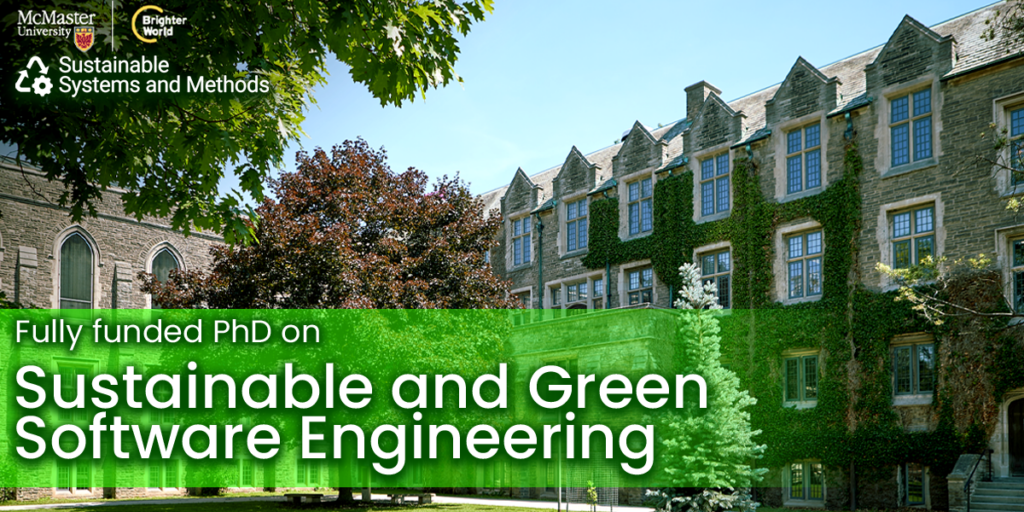The Sustainable Systems and Methods Lab (SSM) is looking for a highly ambitious student to fill a fully funded PhD position on sustainable and green software engineering, with a start in September 2025.

Scope of research
The perception of the value and propriety of modern engineered software systems is changing. In addition to their functional and extra-functional properties, nowadays’ software systems are also evaluated by their sustainability properties. The next generation of software will be characterized by an overall elevated sustainability.
Your work will focus on contemporary challenges in sustainable/green software engineering. During your PhD, you will develop theoretical and practical results: techniques, methods, and tools in support of more sustainable software, including software for AI.
Reach out for more details on the potential topics. The eventual topic is to be scoped together with you, based on your specific interests and background.
You will advance the state of the art of sustainable and green software engineering and along the way, develop critical skills needed to become an independent researcher.
REQUIREMENTS
▸Due to funding reasons, this position is available for those with a compatible legal status in Canada (domestic student or permanent resident)
Expected Background
▸Master’s degree in computer science, software engineering, or related area
▸Rock-solid software development skills and understanding of the overall software engineering lifecycle
▸Solid fundamentals in machine learning or program analysis
▸Familiarity with some of the following topics is considered an asset: model-driven engineering, simulation, sustainability
▸Strong GPA, preferably at least 90%
▸Highly autonomous and proactive personality
As a PhD student, you will…
▸Conduct world-class scientific research in the frontiers of computer science
▸Develop novel methods, techniques, and tools for sustainable and green software engineering
▸Become part of a lively and particularly active research network, and collaborate with international peers
▸Publish at top venues and in top journals of our field
▸Attend top international conferences to present your work (financed by the lab)
▸Apply for your own NSERC scholarship after a year of joint work to further improve your academic resume
Expected Research OUTPUT
There is no predetermined minimum number of papers you have to produce annually.
However, it is fully expected that you dedicate your time to conducting impactful research and to mastering key scientific methods. You will be part of a world-class research environment at McMaster University and an ambitious (yet friendly and inclusive) team in the Sustainable Systems and Methods Lab.
The typical research output in our lab is about 2 high-caliber publications per year at flagship venues or journals; 1-2 medium-caliber publications; and optionally, some smaller research works to help develop your writing style.
It is not expected of you to be a complete researcher on day one. We all have to start somewhere. You will receive intensive training tailored to your specific needs and goals, will work closely with me, and will be called to collaborations with our peers in and outside of the lab.
We are looking for someone who can enjoy the process of exploration despite all its uncertainty, as well as the process of knowledge creation and communication (including written publication and oral presentations).
Important dates
Application starts: October 1, 2024.
Application ends (Canadian students): August 14, 2025.
Start: September 1, 2025. (Preparation and collaboration can start earlier.)
Application process
Apply here: https://applygrad.mcmaster.ca/portal/start_your_app. Indicate my name in your application.
Please also reach out to me directly with a (very) brief letter of motivation summarizing your research interests. (See my contact info).
About McMaster University
One of the four Canadian Universities consistently ranked in the world’s top 100 in the Time Higher Education rankings, McMaster has a proud tradition of academic and research excellence, evidenced by the achievements of our best and brightest whose ranks include three Nobel Prize winners, global business leaders, technological innovators, prominent politicians, public intellectuals, philanthropists and performers. The McMaster community includes 21,441 undergraduate students, 3,519 graduate students, 1,413 full-time faculty, and 170,654 alumni, based in 137 countries worldwide.
The Department of Computing and Software is home to cutting-edge research in many areas of computer science, software engineering, and mechatronics.